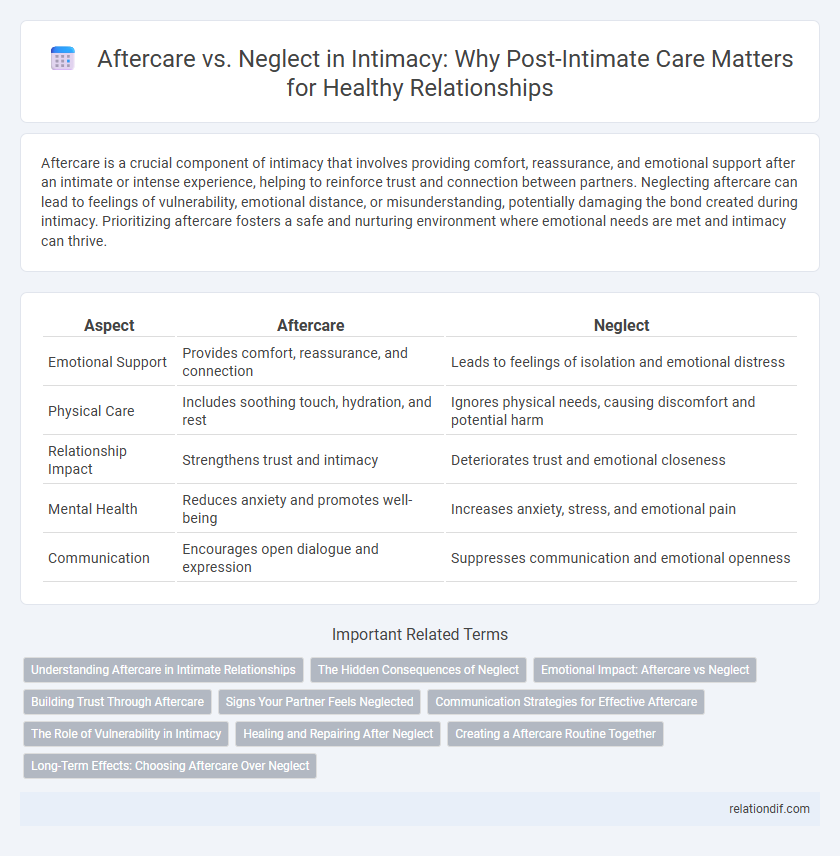Aftercare is a crucial component of intimacy that involves providing comfort, reassurance, and emotional support after an intimate or intense experience, helping to reinforce trust and connection between partners. Neglecting aftercare can lead to feelings of vulnerability, emotional distance, or misunderstanding, potentially damaging the bond created during intimacy. Prioritizing aftercare fosters a safe and nurturing environment where emotional needs are met and intimacy can thrive.
Table of Comparison
| Aspect | Aftercare | Neglect |
|---|---|---|
| Emotional Support | Provides comfort, reassurance, and connection | Leads to feelings of isolation and emotional distress |
| Physical Care | Includes soothing touch, hydration, and rest | Ignores physical needs, causing discomfort and potential harm |
| Relationship Impact | Strengthens trust and intimacy | Deteriorates trust and emotional closeness |
| Mental Health | Reduces anxiety and promotes well-being | Increases anxiety, stress, and emotional pain |
| Communication | Encourages open dialogue and expression | Suppresses communication and emotional openness |
Understanding Aftercare in Intimate Relationships
Understanding aftercare in intimate relationships is crucial for emotional and physical well-being following intimacy, as it involves care practices that help partners feel safe, valued, and connected. Neglecting aftercare can lead to feelings of abandonment, emotional distress, and a breakdown in trust, impacting relationship satisfaction and long-term intimacy. Effective aftercare includes open communication, physical comfort, and reassurance, fostering deeper emotional bonds and resilience in the relationship.
The Hidden Consequences of Neglect
Neglecting aftercare in intimate relationships often leads to emotional wounds that hinder trust and vulnerability, creating barriers to deeper connection. The absence of reassurance and physical comfort after intimate moments can trigger feelings of abandonment, increasing anxiety and emotional detachment. Consistent neglect in aftercare disrupts relationship stability, resulting in long-term psychological distress and diminished relational satisfaction.
Emotional Impact: Aftercare vs Neglect
Emotional impact following intimacy can significantly differ between aftercare and neglect; aftercare nurtures trust, safety, and emotional connection, fostering positive psychological well-being. Neglect, on the other hand, may lead to feelings of abandonment, anxiety, and emotional distress, negatively affecting mental health and relationship satisfaction. Consistent aftercare helps regulate emotions and enhances intimacy, while neglect can impair emotional resilience and intimacy depth.
Building Trust Through Aftercare
Building trust through aftercare involves providing consistent emotional support and reassurance following intimate experiences, which helps partners feel valued and secure. Neglecting aftercare can lead to feelings of abandonment and vulnerability, eroding trust and intimacy over time. Prioritizing attentive aftercare fosters deeper connection and mutual understanding in relationships.
Signs Your Partner Feels Neglected
Signs your partner feels neglected include increased withdrawal, decreased communication, and a noticeable drop in physical affection. They may exhibit irritability, express feelings of loneliness, or avoid intimacy altogether. Recognizing these behaviors early is crucial for fostering emotional intimacy and ensuring effective aftercare in the relationship.
Communication Strategies for Effective Aftercare
Effective aftercare requires clear and empathetic communication strategies that prioritize emotional check-ins and consent reaffirmation to foster trust and comfort. Neglecting aftercare communication can lead to feelings of isolation, misunderstanding, and emotional distress post-intimacy. Implementing consistent verbal and non-verbal cues enhances mutual understanding and supports emotional healing and connection.
The Role of Vulnerability in Intimacy
Vulnerability plays a crucial role in intimacy by fostering deep emotional connections through aftercare, which involves attentive support and reassurance following intimate experiences. Neglect in this context undermines trust and emotional safety, often leading to feelings of isolation and diminished closeness. Prioritizing vulnerability through consistent aftercare strengthens bonds and promotes long-term relational resilience.
Healing and Repairing After Neglect
Healing after intimacy neglect requires intentional aftercare that nurtures emotional trust and physical reassurance. Prioritizing consistent communication, gentle touch, and empathetic listening fosters repair of relational wounds and reinstates safety. Effective aftercare transforms neglect into an opportunity for deeper connection and mutual understanding.
Creating a Aftercare Routine Together
Creating an aftercare routine together strengthens emotional intimacy by establishing clear expectations and mutual support after intimate experiences. Consistent aftercare practices, such as open communication, physical comfort, and validation, prevent feelings of neglect and foster trust. Personalizing aftercare routines to fit both partners' needs enhances connection and promotes a safe, nurturing environment.
Long-Term Effects: Choosing Aftercare Over Neglect
Consistent aftercare following intimate experiences fosters emotional security and strengthens trust between partners, significantly reducing the risk of anxiety and attachment issues over time. Neglecting aftercare can lead to increased feelings of abandonment, emotional distress, and long-term damage to relationship stability. Prioritizing aftercare promotes healthier communication patterns and deepens emotional bonds, essential for sustained intimacy and personal well-being.
aftercare vs neglect Infographic

 relationdif.com
relationdif.com